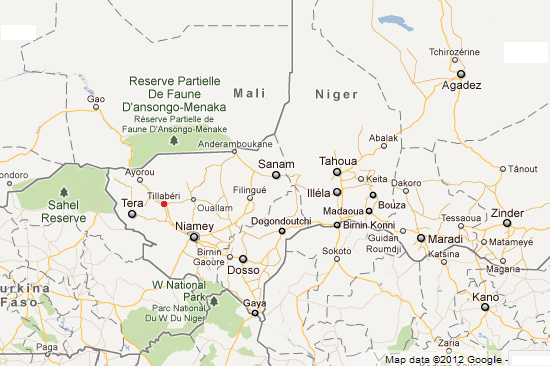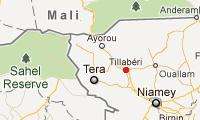Close to 10,000 Malians have found refuge in the Tillabéry region in Niger after being displaced from their homes by violence.

2012 © Google
The Mali-Niger border and the Tillabéry region
NIAMEY, February 9, 2012—As a result of violence in Mali, nearly 10,000 Malians have sought refuge in the Tillabéry region of neighboring Niger, the medical humanitarian organization Doctors Without Borders/Médecins Sans Frontières (MSF) said today. However, instead of finding relief, they are now living in extreme vulnerability in very poor conditions.
“Refugees currently have no access to drinking water, food, latrines, or proper shelter, and [they] have no access to basic health care,” said Benoît Kayembé, MSF head of mission in Niger.
“We’re in emergency mode," he added. "The Tillabéry region was already facing an uncertain situation in terms of food security, and this is being exacerbated by the arrival of thousands of refugees.”
MSF has responded by sending an emergency team to evaluate people’s medical needs in the town of Tchinagodar, in collaboration with local authorities and the Ministry of Health. The MSF team will soon begin providing primary health care and referrals, screening and treatment for malnutrition, vaccinations for children, and health care for pregnant women.
“Our emergency response will evolve and adapt depending on the involvement of other humanitarian organizations in the region,” said Kayembé.
Next week, an MSF team will travel to northern Mali to evaluate the situation of an estimated 30,000 displaced people in the region. Another team will head to Mauritania to evaluate the situation of Malian refugees there.
MSF and its partners—the Nigerien medical nongovernmental organizations (NGOs) Forum Santé Niger (FORSANI) and Bien-Être de la Femme et de l’Enfant au Niger (BEFEN) as well as the international NGO ALIMA—work in close collaboration with the Nigerien Ministry of Public Health in the fields of child malnutrition, pediatric care, and maternal health in a number of health posts and hospitals in the regions of Maradi,Tahoua, Zinder, and Agadez. MSF also provides medical care to migrant or displaced people in the region of Agadez. In addition, MSF supports Nigerian health authorities in responding to emergencies when they arise.




